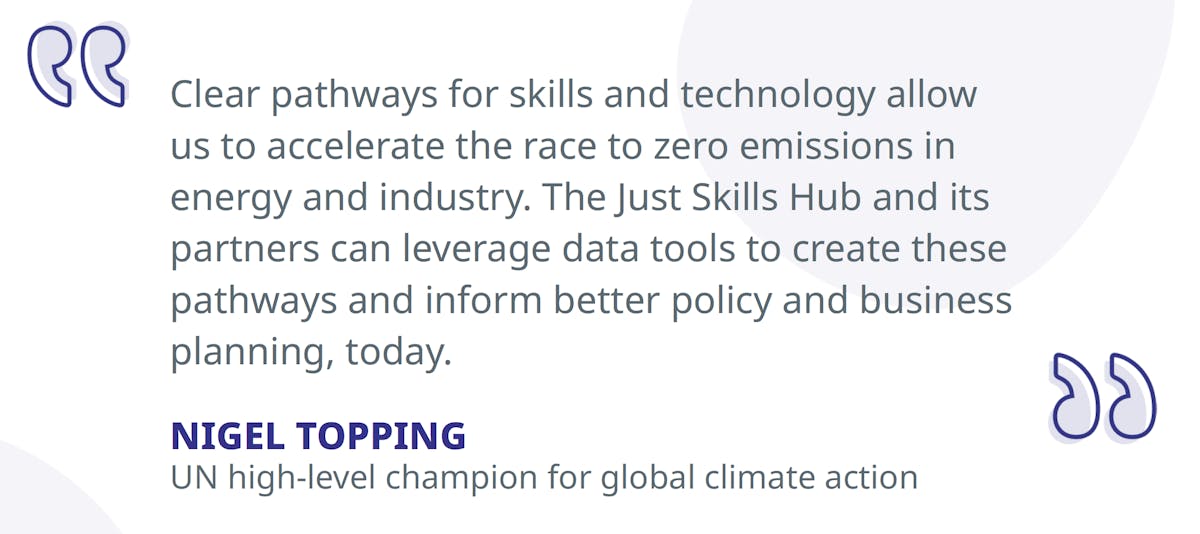Sustainably Supporting Workers in the Green Transition - A Technology-enabled Human-centered Toolkit for Just Transitions
In the pursuit of a sustainable net-zero future, the transition away from carbon intensive energy has become imperative. While this shift offers substantial benefits in terms of reduced carbon emissions and a greener future, it also presents challenges for regions heavily reliant on coal extraction and consumption. As the energy landscape evolves, the socio-economic struggles faced by these regions come into sharp focus, highlighting the intricate balance between environmental progress and the preservation of livelihoods and economic activity.
While workers in resource-intensive industries bear the brunt of the consequences of transition, employers face the duality of mitigating the fallout and addressing their own set of obstacles. Employers are tasked with meeting skilling requirements for their workers, or risk losing competent workers to bigger cities with other work opportunities. The threat of urban migration, coupled with facing the pressure of new industrial standards and practices creates pressure to ensure employers sufficiently equip their employees with the necessary skills to transition successfully. While this may prove to be difficult, it is not impossible.
The Just Skills Hub presents a tangible and sustainable toolkit to ensure a smooth and sustainable transition which would benefit both the transitioning workforce and their employers.
- Identify affected workers:
The Just Skills Hub collects demographic data of affected workers, collecting statistics about age, sex, and geographical region to create a deeper understanding of those that would either suffer from unemployment or have their jobs transformed. A nuanced comprehension of this leads to improved policies that can directly address any given worker in their transition scenario.
2. Conduct A Skills Audit:
The skills audit furthers the narrative of creating a nuanced understanding of the current workforce and skill supply. In creating an understanding of the skill supply, stakeholders are enabled to measure the gap between the existing skills of workers and the skills required in green jobs and industries. Based on this, policymakers can adjust education and curricula to fit in with this. Workers are also empowered in understanding their own capabilities and realizing other opportunities which are in line with their current skill set.
3. Build Partnerships to Manage Transitions and Include Social Partnerships:
The Just Skills Hub stands as a unification platform for the various stakeholders of the transition to engage with each other and build sustainable partnerships. The hub is a one-stop-shop for workers, policy makers, employers, and education providers to learn from each other, gain insight into transition related problems, and find solutions together.
4. Identify Resilient Occupations:
By working together with local vacancy board and/or labour market information providers, the Just Skills Hub maps occupations that are resilient - these refer to occupations that remain steadfast in the face of externalities such as climate changes and are resistant to shocks.
5. Identify Pathways:
With the necessary stepping stones in place for collaboration through the previous steps of the Just Skills Hub, the pathways to attaining resilient and adjacent careers are identified. The multistakeholder nature of the Hub allows the relevant actors to engage with each other - policy makers and education providers alike can work towards making resilient occupations attainable for future and current generations of workers in coal intensive regions. Additionally, they can look into career prospects in coal intensive regions which will improve the prospects fo future generations to retain the workforce and avoid losing workers to bigger cities.
6. Design curricula and upskilling pathways to ensure workers can transition:
Employers can greatly benefit from understanding the current skill supply and can create training opportunities to retain their workers. Education providers can also integrate this into their learning agenda to
7. Begin Provision of Early Job Search and Career Guidance Assistance:
The Just Skills Hub makes use of the core SkillLab mobile application in this stage to offer on-going career guidance to laid off workers. At this stage, if this is successful, the result would be a shorter period of an unemployed workforce, reducing the amount of workers that take an early pension and strengthening other industries to create a robust economy.
8. Provide Ongoing Active Labour Market Policy Support and Guidance:
To create a truly sustainable and resilient workforce would require constant surveillance and reflection. Providing on-going support to monitor the progress of the implementation of policies will ensure long-term resilience.
